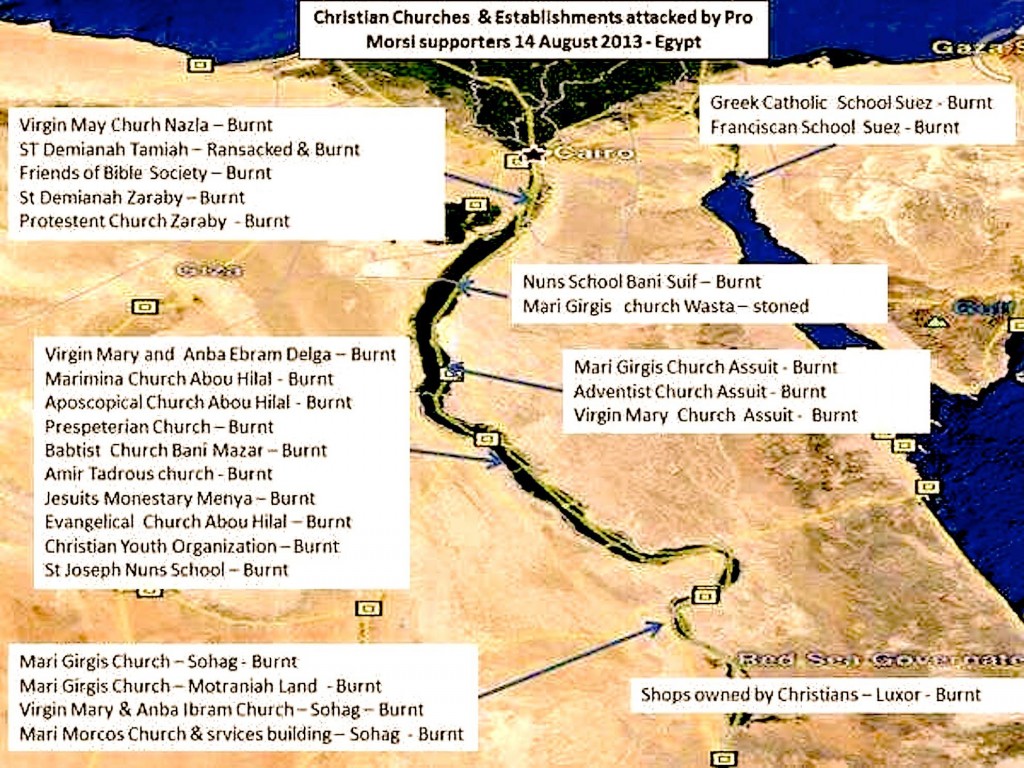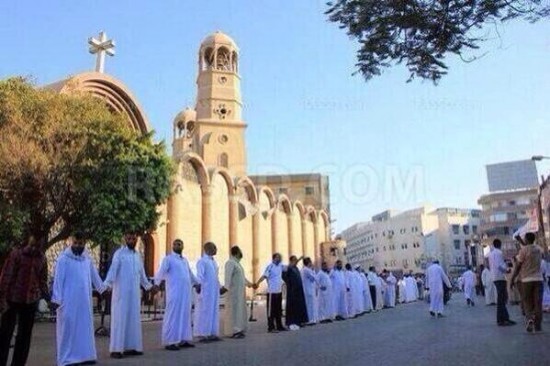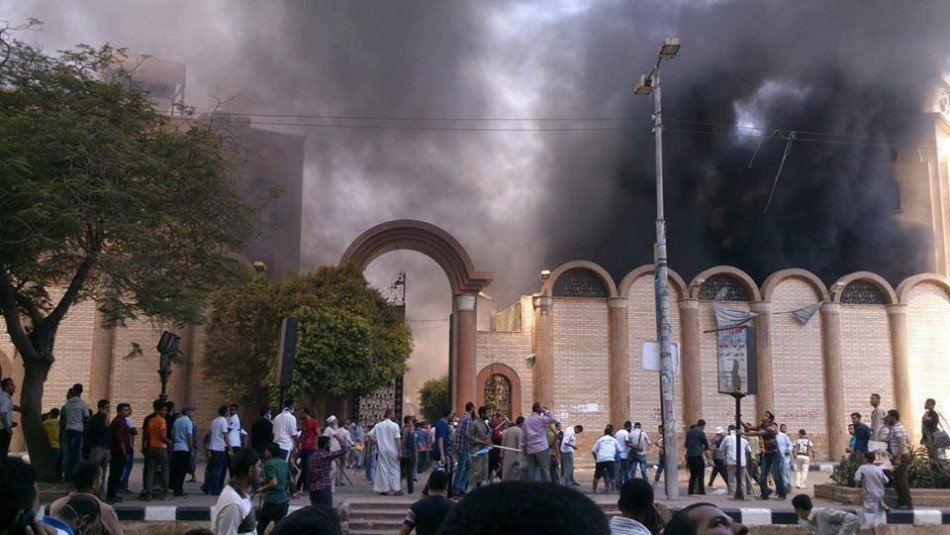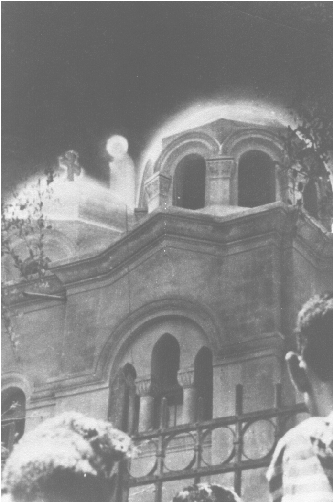
The Coptic Christian Church in Egypt has put out the following statement,
“The Egyptian Coptic Church is following the unfortunate developments on the ground of our country Egypt and emphasizes its strong stance with the Egyptian police, armed forces and other organizations of the Egyptian people in the face of groups of armed violence and black terrorism…While we appreciate the sincere and friendly position that understands the nature of the developments, we strongly deplore the media fallacies that are prevalent in Western countries.”
But for some reason, our nation officially seems to still be pining for Mohammed Morsi and his despotism leaning Muslim Brotherhood.We seem to be more concerned about saving face than we are about changing our policy based on the facts on the ground. “We don’t take sides…”
We’re kind of like how Fonzie was when he had trouble saying he was wrong. Remember that scene from the show Happy Days?
Roll clip,
Eventually, the Fonz ate crow and was able to say the word, and ask for forgiveness. Will we? I hope and pray so. And I do so for the people of Egypt, who deserve our support, a support which benefits all, and not just the few who are bent on bending the will of a people to cowtow to their own narrow agenda.
But don’t listen to me. Listen to folks who are there. Listen to an Egyptian atheist name Maikel Nabil Sanad, who writes the following over at Huffington Post,
Wednesday, a few minutes after the Egyptian police attacked the Muslim Brotherhood sit-ins in Cairo, Islamists started targeting Christians (Copts) and churches all over the country. Over 25 churches were burned down, and lots of shops and private property of Christians were robbed and destroyed.
Among the burned ones was the Adventist Chapel in Assiut, the place where I attended kindergarten for around two years. I remember how I didn’t like it because one of the servants there used to hit me. I remember also how I used to smell the lemon trees in the chapel yard.
After burning the Adventist Chapel, Islamists in Assiut burned down St. George church also. Nuns had to flee the church to surrounding buildings, while Islamists took furniture from the church and burned it in the street. I used to pray in this church for six years, and had my Sunday school there for more than 14 years. I have lots of good and bad memories related to this place, which I once considered my home.
I don’t consider myself a Christian any more. Since I became an atheist in 2007, I faced lots of harassment from Egypt’s Christians. As the Coptic Orthodox Church has medieval beliefs, similar to how Catholics were in the middle ages, they went crazy because of my convert to atheism. Priests visited me in my house and threatened me not to spread my atheist ideas. Rumours were spread against me by church servants. Some Christians tried to put me in jail for blasphemy, while others incited the army to put me in jail.
But for me, as I follow what’s happening to the Christians in Egypt right now, I’m forced to remember what happened to the Egyptian Jews 70 years ago, when The Muslim Brotherhood did the same thing by bombing synagogues and burning Jewish property.
At that time, Egypt had around 80,000 Jewish citizens. After the coup of 1952, Nasser joined the Muslim Brotherhood in the campaign against Jews. Nazi criminals were given refuge in Egypt, while Egyptian Jews were driven to concentration camps. The Egyptian army later deported most of the Egyptian Jews, and removed their citizenship, after robbing their properties. Now there are drastically fewer Jews in Egypt.
After that, other religious minorities were targeted also. Shiite Islam and Bahaism were banned by law, with their properties given to Al-Azhar. Christians were targeted by both Islamists and the army. The same army which the U.S. funds, while this army forces recruits to yell every day “No God Except Allah, Mohammed is the prophet of Allah, Jews are enemies of Allah.”
The same army which massacred the Christian protest in Maspero in Oct. 2011, leaving over 20 Christians killed, and before that in Feb. 2011 attacked monks in St. Bishoy Monastery with RPJs, while soldiers were enjoying breaking crosses. Violent attacks happen against Christians every day by Islamists, while the state makes sure each time that the predators are not prosecuted. In the same time, Ayman Youssef Mansour, Gamal Abdu Massoud and other Christians are in prisons now for blasphemy because they expressed their Christian beliefs on Facebook.
My fear is that Egypt’s Christians are going to face the same destiny as its Jews. As of now, many Egyptian Christians have left the country already, leaving behind around 8 million more. Now, as Egypt may face a civil war after the July 3 coup, massacres against Christians will happen more, rousing more fears of a new holocaust.
Might I remind you that our current Administration decried the ouster of Mr. Morsi and the Muslim Brotherhood? They were democratically elected, and all, so there you go. Which brings me to the next piece I’ll share with you.
What follows is written by Robert Reilly, and posted on the Intercollegiate Review website. It’s title needs a little editing (it should read Reichswehr, vice Wehrmacht), but you get the idea.
Egypt’s Military: Doing What the Wehrmacht Should Have Done in 1933
Thirty million people in the streets of Egypt, with the help of the Egyptian military, have saved the United States from the consequences of its disastrous policy of supporting the Muslim Brotherhood since President Barack Obama came to office. Just months after his inauguration in 2009, Mr. Obama appeared in Cairo to address the Muslim world. He ensured that members of the Muslim Brotherhood were seated in the front row of the auditorium at Cairo University. Since the group was still officially banned in Egypt, no one from President Hosni Mubarak’s administration could attend. The message from the seating arrangement was unmistakable: even at the price of snubbing his official host, Mr. Obama recognized the Muslim Brotherhood as a legitimate player in Egyptian politics. Already, this was clearly interference in the internal affairs of the Egyptian state.
Former British ambassador Charles Crawford later characterized Obama’s quixotic address in the following way: “It boiled down to a well delivered speech full of clever emollient phrases that ultimately sent a message of appeasement to militant Islamist tendencies: Under my restrained leadership the United States will respect and accept conservative forms of Islam. Even if Islamism gets too aggressive we don’t plan to do much about it.”
Why would the United States want to give the green light to militant Islam? Wasn’t militant Islam, after all, the problem? Of course, President Obama has never publicly admitted that it is as a form of the “violent extremism” he opposes. But perhaps the Obama administration thought there was no alternative, or perhaps it was simply ignorant of the true nature of the Muslim Brotherhood. Most likely it thought that the Brotherhood could be tamed if it were given political responsibility. At any event, its representatives said some extraordinarily strange things. At a House Intelligence Committee hearing on February 10, 2011, Director of National Intelligence James Clapper described the Muslim Brotherhood as a “largely secular” organization with “no overarching agenda.” This was a rather unusual characterization of a group whose motto is: “Allah is our objective. The Prophet is our leader. The Qur’an is our law. Jihad is our way. Dying in the way of Allah is our highest hope.” If that is secular, what might the religious be?
As for an overarching agenda, the de facto spiritual head of the Muslim Brotherhood, Sheikh Yusuf al-Qaradawi proclaimed: “Islam is a comprehensive school of thought, a creed, an ideology, and cannot be completely satisfied but by [completely] controlling society and directing all aspects of life, from how to enter the toilet to the construction of the state.” That means the rule of sharia (Islamic jurisprudence), to which the Muslim Brotherhood has been dedicated since its inception in 1928. The other objective is the restoration of the universal caliphate. The vehicle for doing both is establishment of a one-party totalitarian state.
Totalitarians Don’t Share Power
The totalitarian parties on which the Muslim Brotherhood was modeled – Lenin’s Communists, Mussolini’s Fascists, and Hitler’s National Socialists – showed no inclination toward moderation once having obtained political power. All of them remained true to their principles. Once in power after Mubarak’s overthrow, President Mohammed Morsi gave a hint of what was to come by openly calling for Shaykh Omar Abdel-Rahman’s repatriation to Egypt from the U.S. federal prison in which he is incarcerated. The famous blind Shaykh was considered the spiritual inspiration behind the 1993 World Trade Center bombing and is serving a life sentence in connection with a subsequent plot to bomb New York landmarks and tunnels. Might this have been a sign of trouble to come?
In January, a congressional delegation, including Senators John McCain and Lindsey Graham, were in Cairo visiting President Morsi when an embarrassing pair of videos appeared on the site of the Middle East Media Research Institute (MEMRI), documenting the virulent anti-Semitism Morsi had expressed in campaign appearances in 2010. In a September, 2010 interview, Morsi gave a preview of what Egypt’s approach to Israel might be:
Either [you accept] the Zionists and everything they want, or else it is war. This is what these occupiers of the land of Palestine know – these blood-suckers, who attack the Palestinians, these warmongers, the descendants of apes and pigs…We must confront this Zionist entity… We want a country for the Palestinians on the entire land of Palestine, on the basis of [Palestinian] citizenship. All the talk about a two-state solution and about peace is nothing but an illusion…
In another 2010 appearance at a rally in his hometown in the Nile Delta, Morsi said:
We must never forget, brothers, to nurse our children and our grandchildren on hatred for them: for Zionists, for Jews.” Morsi added that Egyptian children “must feed on hatred; hatred must continue… The hatred must go on for God and as a form of worshiping him.
Yep, that was our guy. Read the whole thing.
Was the Egyptian army wrong to depose Morsi? Or were they acting in the best interests of the entire country, like how the Compendium of the Social Doctrine of the Church sets things down in chapter eight?
400. Recognizing that natural law is the basis for and places limits on positive law means admitting that it is legitimate to resist authority should it violate in a serious or repeated manner the essential principles of natural law. Saint Thomas Aquinas writes that “one is obliged to obey … insofar as it is required by the order of justice”.[823] Natural law is therefore the basis of the right to resistance.
There can be many different concrete ways this right may be exercised; there are also many different ends that may be pursued. Resistance to authority is meant to attest to the validity of a different way of looking at things, whether the intent is to achieve partial change, for example, modifying certain laws, or to fight for a radical change in the situation.
401. The Church’s social doctrine indicates the criteria for exercising the right to resistance: “Armed resistance to oppression by political authority is not legitimate, unless all the following conditions are met: 1) there is certain, grave and prolonged violation of fundamental rights, 2) all other means of redress have been exhausted, 3) such resistance will not provoke worse disorders, 4) there is well-founded hope of success; and 5) it is impossible reasonably to foresee any better solution”. Recourse to arms is seen as an extreme remedy for putting an end to a “manifest, long-standing tyranny which would do great damage to fundamental personal rights and dangerous harm to the common good of the country”. The gravity of the danger that recourse to violence entails today makes it preferable in any case that passive resistance be practised, which is “a way more conformable to moral principles and having no less prospects for success”.
e. Inflicting punishment
402. In order to protect the common good, the lawful public authority must exercise the right and the duty to inflict punishments according to the seriousness of the crimes committed. The State has the twofold responsibility to discourage behaviour that is harmful to human rights and the fundamental norms of civil life, and to repair, through the penal system, the disorder created by criminal activity. In a State ruled by law the power to inflict punishment is correctly entrusted to the Courts: “In defining the proper relationships between the legislative, executive and judicial powers, the Constitutions of modern States guarantee the judicial power the necessary independence in the realm of law”.
403. Punishment does not serve merely the purpose of defending the public order and guaranteeing the safety of persons; it becomes as well an instrument for the correction of the offender, a correction that also takes on the moral value of expiation when the guilty party voluntarily accepts his punishment. There is a twofold purpose here. On the one hand, encouraging the re-insertion of the condemned person into society; on the other, fostering a justice that reconciles, a justice capable of restoring harmony in social relationships disrupted by the criminal act committed.
Now I don’t want to give you the impression that I think all Muslims are a bunch of lawless thugs bent on using terrorism, and calling for a “Day of Rage” on the holiest day of the week. No, that’s just what the guys our administration is backing did. Other Muslims across the country were putting their lives on the line in a futile attempt to save their Christian brethren from losing their places of worship.

Which wound up being victims of arson anyway.

What does the average Egyptian have to say about what is happening? I don’t really know, but here is what Karem Fahim of the New York Times reports them as saying,
CAIRO — A man who sold eggs said the army had waited too long to attack the Islamists. An accountant said the police had stormed the protests with an efficiency he had not seen in years.
In the working-class neighborhood of Imbaba on Thursday, a teacher, Mohamed Abdul Hafez, said the hundreds of Islamists who died the day before mattered little to him. “It’s about the security of the country,” Mr. Hafez said.
Egypt seemed more divided than ever after a brutal day of violence here that left hundreds of people dead. Supporters of the ousted president, Mohamed Morsi, mourned those killed, vowed revenge, planned their next moves. Many other Egyptians, though, directed their ire at the protesters who had camped out in the streets for weeks. For them, what occurred made sense.
“It was necessary,” Akmal William, standing in his auto-detailing shop on Talaat Harb Street, said of the raid by soldiers and police officers. “They had to be strict.”
Witnesses described a disproportionate, ruthless attack. Condemnations came from human rights advocates, a few Egyptian political figures, and from abroad. But many Egyptians viewed things differently, focusing on what they said were continuing threats from Mr. Morsi’s supporters, who were frequently referred to as terrorists. In their view, the army was the only force standing in the Islamists’ way.
Between the parallel realities, others were torn between the claims of the security forces of violent demonstrators who threatened the country — a view parroted by the state news media — and what they heard from Islamist friends about how the battle on the streets had unfolded on Wednesday morning.
In Imbaba, a neighborhood that seems to catch all the nation’s political currents in its congested alleyways, many people regretted the bloodshed. But they asserted that the alternative was worse. The Muslim Brotherhood, Mr. Morsi’s political party, was holding back the country with endless sit-ins and protests, many said. And the longer the army waited to act, the weaker Egypt seemed to them.
That conviction only grew stronger amid reports about Islamist violence, including the storming of a government building in Giza early Thursday. Mr. William, a Coptic Christian, was preoccupied by a spate of attacks on churches and Christian homes across the country, a spasm of collective scapegoating by some of Mr. Morsi’s supporters.
“They won’t go easily,” he said, adding that churches “are still being burned.”
Some people seemed to buy the relentless propaganda of the state news media, saying they had come to realize that the Brotherhood was actually the mysterious “third party” blamed by successive Egyptian leaders for all manner of evil deeds. At least one man just seemed anxious to heap praise on the country’s leaders, irrespective of their actions, as if Egypt were still frozen in its authoritarian past.
Others had arrived at their own conclusions, and explained in detail why the government had been forced to act against Mr. Morsi and his supporters, regardless of the consequences.
“I don’t like conspiracy theories,” said Ahmed Mustafa, 37, an accountant who sat in a cafe. “I’m against violence. I gave my vote to Morsi, and he disappointed me. They did things their way, and it was a false way.”
Much as our way is a false way for trying to paint Mr Morsi, and the party he represents, as a kind of democratic, republican form of government loving, savior of the people. We are wrong in that regard, and it’s time to make things right.
As always, join me in praying for the people of Egypt, and for our country’s leaders too. Pray for those whose lives have been lost in this struggle, and for their grieving families. It’s what we are called to do.
Our Lady of Zeitoun, pray for us.
UPDATES:
AP: Islamists Hit Coptic Christian Churches, Torch Franciscan School.
Al Jazeera: Egypt’s Fate in the Balance Amid Warnings of War.
NCRegister: 40 Churches Burned, Looted or Destroyed in Egypt.
Patheos Muslim Channel: How can we live a “normal” life when the world around us is burning?
And stuff the State Department missed back when Morsi was elected…
“In Egypt, not many people like Morsi,” he said. “They don’t want Egypt to turn into an Islamic state. They want it to be more like America, in a way, with separation of church and state.”
No kidding.












